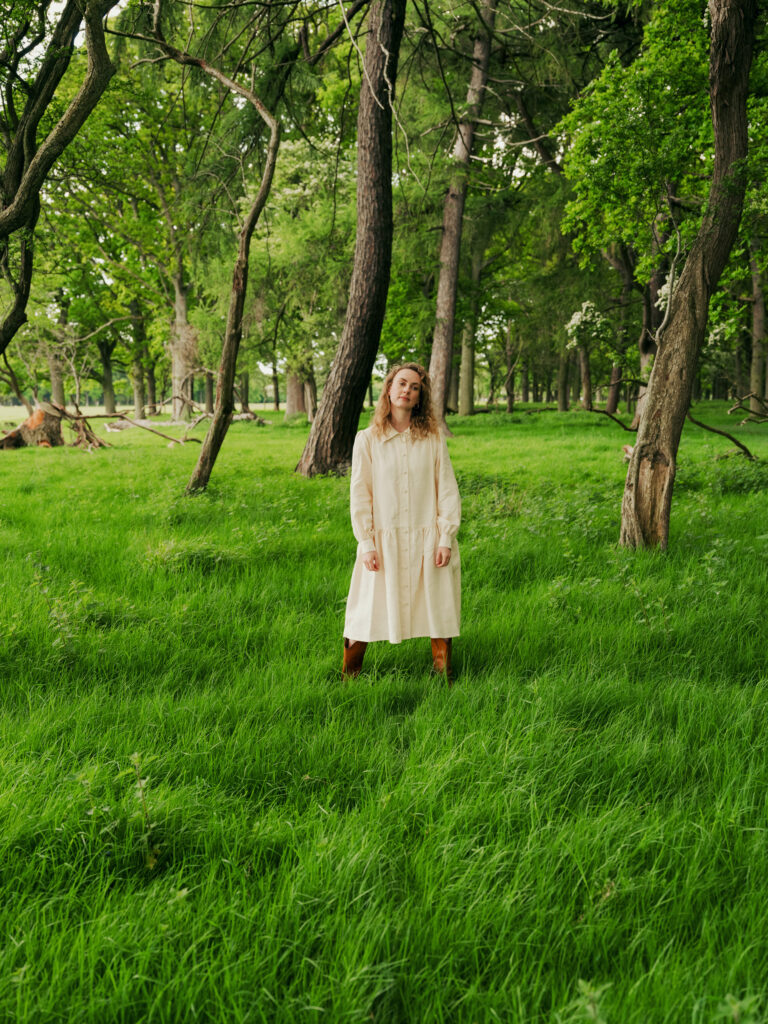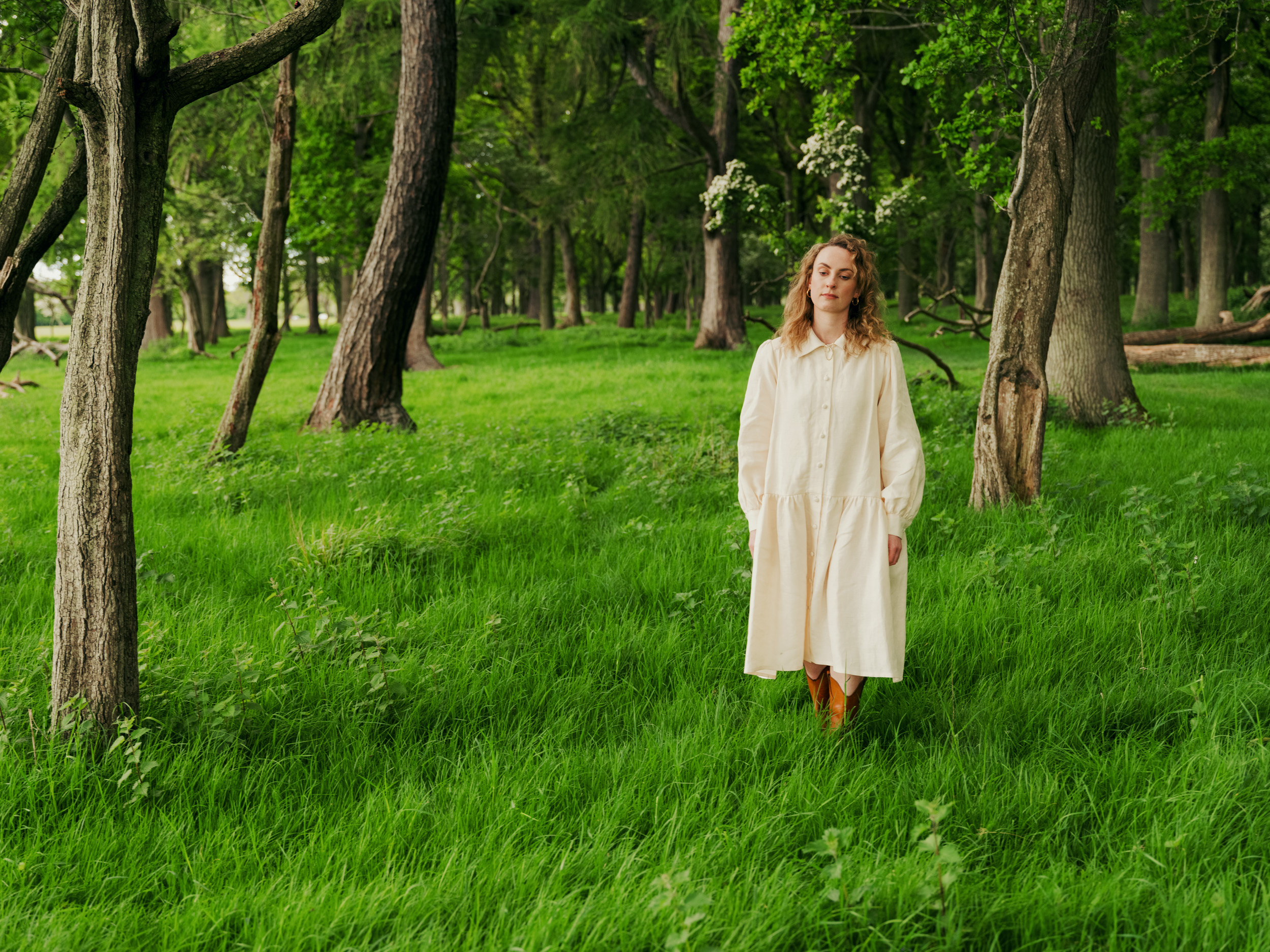Music played a significant role in the upbringing of the Dublin folk singer-songwriter Niamh Bury. “I think I’m very influenced by what my family were listening to,” Niamh tells Post-Burnout. “Like, we’d have a lot of ‘60s, ‘70s folk around, when I was growing up. And then my brother was a big influence on me. He’s a good bit older – he’s nine years older than me – so, I just thought everything he did was very, very cool. So, yeah, he passed a lot of ‘90s grunge bands onto me, and some singer-songwriters, like Jeff Buckley and Fiona Apple, are huge for me, and that comes from him. So, yes, I’m very grateful to them for having good taste in music. [Laughs]”
While majoring in English Literature, Niamh studied music for a year in university but dropped the subject as she felt that vocal training demystified the elusive and preternatural charm she found from singing. “Music is such an intuitive thing,” Niamh says. “It’s so much in the body, as well, that trying to dissect it with your head doesn’t always really work. But, yeah, like, for me, when I’m writing a song, I’m much more intuitive with the music, and the lyrics are much more something that I will critique, myself, and work on and rework, whereas the music, it’s generally something that’s instant and comes out. So, yeah, I like to try and get the balance with that, because I think there is a balance, like, not to overanalyse things and let them flow, but still, obviously, you still want them to be good. [Laughs]”
While at the Inishowen Singing Weekend in Donegal in 2014, Niamh discovered a new scene of Irish musicians, whom she viewed as kindred spirits. “I’m very involved in traditional singing, as well. Irish traditional singing,” says Niamh. “So, that’s kind of another part of what I do, outside of songwriting. So, that came about when I finished college. I suppose I was sort of searching for a bit of a musical scene, because there was nothing really kind of speaking to me, at that time, but then I sort of met a crowd of young traditional singers, and it blew me away that they were into the same sort of old songs that I was. So, yeah, I suppose that has become known as the Folk Revival in Dublin, which, love it or hate it as a name. But, yeah, I think there’s definitely something in the water, going on in Dublin, and there’s some amazing, amazing artists and amazing musicians around.”

Courtesy of Amplify Agency
While for years Irish trad and folk music was seen as something solely enjoyed by Irish people and their descendants, throughout the 20th Century and now, into the 21st Century, the music has not only seen its influence spread into other genres of music, from rock ‘n’ roll to rap to rave to punk and so on, and has also enjoyed global success with people with no Irish lineage. We asked Niamh why she feels that Irish music persists in its popularity and global appeal. “I think the music, and the songs, and the themes, and the topics that are covered are so strong and solid that I don’t think they’re ever going to go anywhere. They’re very universal,” she responds. “So, I think that it lends itself in that way. It’s also very much a living, breathing tradition, so I agree, it can only be strengthened.
“To me, when it’s performed in a session – which is still very alive and well – it’s kind of in its purest form, and there’s different etiquette rules and different things around that that keep the tunes pure, almost. Yeah, I don’t know if the word ‘pure’ is right in that context, but I think that, in itself, it is strong enough and I don’t think it’s going anywhere, so I think there definitely is room to experiment, and I think with musicians coming up now, a lot of us will have been influenced by loads of things during our teenage years. Like, obviously, Lankum have talked about punk and hardcore, metal, film scores even, probably. So, yeah, I think there is a lot of room for experimentation, and that’s how it grows and stays alive.”
Niamh has been experiencing this growth in interest in Irish folk first-hand. This year alone has seen her begin to release her music to critical acclaim and rave crowd reception, have features and interviews written up in both domestic and international outlets, enjoy radio play on RTÉ and BBC, and play support slots for the likes of Dermot Kennedy and Ye Vagabonds.
When we asked Niamh if this growth felt spontaneous or gradual to her, she responded, “I would say very gradual. Everything that you see has been in the works for a long time. So, yeah, I suppose I’ve been making music for…I’ve been writing songs for a long time, since I was a teenager, so it’s all…I guess this is the first year that I’m actually properly releasing stuff, so it does feel different, in terms of I’m actually getting some feedback now and I’m kind of doing it on a bigger scale. But the songs are a few years old, so they’ve been in my life for a long time. [Laughs]”
Indeed, Niamh’s three singles which were released this year – “Beehive,” “Who Am I To Tell Him?”, and the recently-released “Discovery”- were all recorded back in 2021 and were produced and engineered in conjunction with Ye Vagabonds’ Brían Mac Gloinn in Black Mountain Studios in Dundalk. It was these recordings which enabled Niamh, along with the experimental folk band ØXN, to become the first two new artists to be signed with the iconic Irish major label Claddagh Records, in twenty years.
“I guess they approached me, probably about a year ago,” Niamh says on signing with Claddagh. “I recorded an album, so they were pretty happy that I had that and I could show it to them, and they liked it. So, yeah, I’m really happy to be working with them. It’s interesting, because, obviously, they are known as a trad label – trad/folk, which…however you want to define that [Laughs] – but the songs I’m bringing out aren’t trad; they’re my own. So, yeah, it’s great.
“They’ve been really great to work with, and I think there’s a lot of positivity because, as you say, it is the most iconic label in Ireland, and it’s great to be working with people who are actually on the ground in Dublin, and it’s a total honour. It’s such a historical label and it’s brought out some amazing music over the years, and, like, yeah, the founder, Garech de Brún, was a serious patron of the arts; like, not only a businessman, he actually really loved Irish music and thought that it should be elevated to the level of rock ‘n’ roll and everything else that was more popular in the ‘70s. So, it’s a huge honour, and I feel very lucky and privileged to be a part of it.”
Niamh Bury’s latest single, “Discovery,” is out now. You can keep up to date with Niamh on her website, which features her music, social media links, and upcoming tour and release information. You can also hear the full interview that we conducted with Niamh on today’s episode of POSTBURNOUT.COM Interviews… at 14:00 (IST) on YouTube, Spotify, Apple Podcasts, and Amazon Music Podcasts.

Aaron Kavanagh is the Founder and Editor-in-Chief of Post-Burnout. His writing can also be found in the Irish Daily Star, Buzz.ie, Totally Dublin, The GOO, Headstuff, New Noise Magazine, XS Noize, DSCVRD and more.

 POST-BURNOUT
POST-BURNOUT